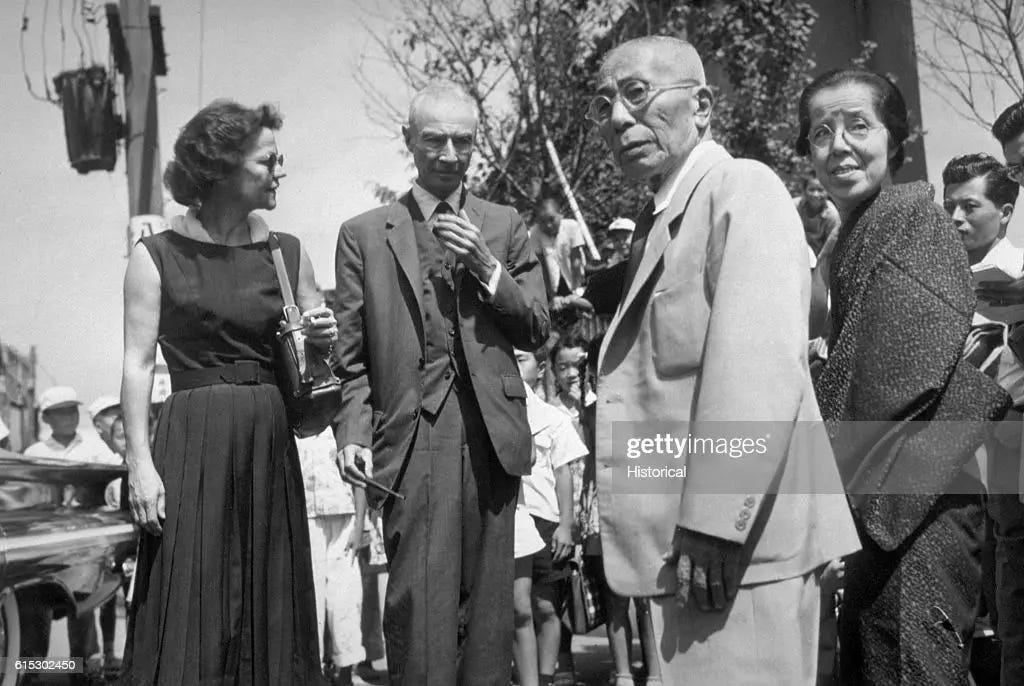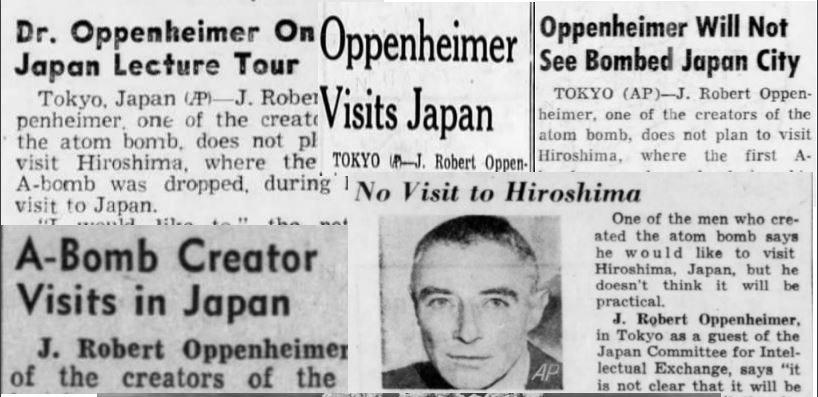Greg Mitchell is the author of a dozen books, including “Hiroshima in America,” “Atomic Cover-up,” and the recent award-winning“The Beginning or the End: How Hollywood—and America—Learned to Stop Worrying and Love the Bomb.” He has directed three documentary films since 2021, including two for PBS (plus award-winning “Atomic Cover-up”). He has written widely about the atomic bomb and atomic bombings, and their aftermath, for over forty years. “Atomic Cover-up” now available free for anyone with a library card via Kanopy.
As an update, sorry, nothing new on possible release of Christopher Nolan’s global hit Oppenheimer in Japan.
Yes, to answer your next question, J. Robert Oppenheimer did visit Japan even after his name was so closely associated with the atomic strikes in 1945, which killed as many as 180,000 civilians. And he was, amazingly, invited to….Hiroshima. Although Christopher Nolan’s Oppenheimer does flash forward to the 1960s and Oppie earning some redemption, there’s no mention of this visit.
Oppenheimer had accepted an the invitation by the Japan Committee for Intellectual Interchange (JCII) to deliver a series of lectures in Tokyo and Osaka. At an arrival press conference on September 5, 1960, he was, no surprise, asked by a Japanese reporter “about your feelings in coming to Japan as a man responsible for the development of the bombs that were dropped on Hiroshima and Nagasaki.”
In his usual suit and smoking his pipe, he paused and replied, “I do not think coming to Japan changed my sense of anguish about my part in this whole piece of history. Nor has it fully made me regret my responsibility for the technical success of the enterprise.” He paused, then added: “It isn’t that I don’t feel bad. It is that I don’t feel worse tonight than last night.”
So this was the usual conflicted and confusing Oppenheimer way (captured fairly well by Nolan), hinting at regrets but letting them remain vague, unresolved.
He was also asked, again, no shocker, if he would be visiting Hiroshima. “I would like to,” he replied, “but it is not clear that it will be practical.” Of course, “practical” carried a lot of weight there.
In the following days, Oppenheimer found most Japanese, especially fellow scientists and academics who attended his lectures, eager and happy to see him. Speaking to the press, he said that atomic scientists “have the responsibility to inform and explain what they know publicly, if allowed…Japanese people know that this is a time in human history of profound change and problems. I have the duty and hope to talk and meet your people about our common problems and about the difficulty which confronts us.”
A reporter asked if he believed the world would faced “annihilation” due to scientific progress. Oppenheimer responded, “I share that fear.”
At a September 17 lecture in Osaka (in a hall I visited sixteen years later), he said that nuclear weapons were indeed “a source of terror, but we cannot by any action recreate the world of 20 years ago.”
Near the end of his talk, a student stood up but he was no average youth. Ted Reynolds, 21, was the son of parents who had long lived in Hiroshima where they became internationally famous for protesting nuclear weapons tests in the Pacific. (The “Friendship House” they founded, which I visited, still is very active there.) Young Reynolds was there to offer an invitation from his father to come to Hiroshima—a letter Oppie accepted and apparently kept for the rest of his life. The invite declared that the residents of Hiroshima “bear no animosity toward any individual for the tragedy which overtook them…their only hope is that there will never be another Hiroshima….We can understand the delicacy of the situation, but I do hope your decision was not dictated by any feeling that you might meet with personal unfriendliness.”
Having spent a few weeks in Hiroshima myself in 1984, I can say that I do not doubt the sincerity of these forgiving words and focus on the future.
Oppenheimer said he would love to “quietly” spend time in Hiroshima—without cameras or press—and perhaps even visit the new Peace Park. He did not make it. His sponsors wanted to avoid any controversy. Oppenheimer would pass away seven years without returning to Japan—and still, when pressed, defending the use of the bomb against two of its large cities (which he helped target).






So, what I was trying to say, is whether that general sense of forgiveness was universally shared or was there pressure on these stigmatised people to give that impression? Oppenheimer was not an anti nuclear campaigner in the same way as Rotblat, Einstein, Russell and did not sign any significant treaties on the matter. His objection to the Hydrogen bomb seems to have been as much practical as moral ('technologically sweet') so he was never effective or instrumental in working towards a safer future.
I'm not sure if an actual visit to Hiroshima would have altered Oppenheimer's perception that what he helped to achieve was terrible but necessary. Again, the real challenge would for him to have met with survivors and their families. Any 'forgiveness' would only be legitimate coming from these people, certainly not the Japanese government, who side-lined them for years. I watched a few docs and have heard survivor comments on Americans in general but not Oppenheimer in particular.